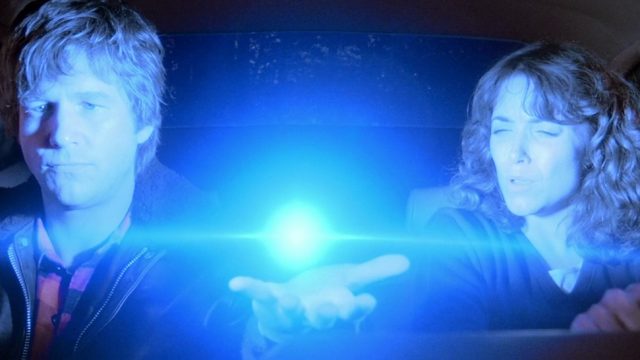Ever since I rewatched The Thing last year, I’ve been on a Carpenter kick, as I realized I’d already seen and enjoyed so much of his filmography that I should probably fill in the gaps I still had. From 1976 to 1988, John Carpenter had a practically unassailable run of films any director would envy (and while there is some disagreement, I’d argue 1994’s In the Mouth of Madness was his last great film, Memoirs of an Invisible Man in 1992 being the dud that keeps it from being another consecutive winner). Starman does not have the reputation of many other films in this epic run; hell, even Christine is likely better known thanks to the Stephen King connection. But…what the hell, it’s actually one of Carpenter’s best, and we are all doing the world a disservice by not treating it as such and talking it up more. Sure, when you think “John Carpenter,” you don’t think “alien-human road trip romance,” but it’s warm and tender and moving (yes, a John Carpenter movie that is warm and tender and moving), and it’s an essential component of his filmography in how it pointedly does not fit as well as it how it does.
The most obvious thing that sets Starman apart from most Carpenter films — so much so that a couple of my friends either forgot or never even knew it was by Carpenter — is that the alien here is friendly. Most Carpenter films are about beings from another world being bad — a thing from outer space, Satan from another dimension, ghost pirates from the ocean, and so on. He tends to emphasize the uncanny nature of these beings to induce fear, but here, the Starman’s uncanny nature is quite endearing. Apart from the initial body horror of his transformation, Jeff Bridges is just a bit off. Karen Allen even notes that since he’s built from her husband’s DNA, his nose is wrong because her dead husband’s nose had been broken.
Conversely, humans are also good, when Carpenter films tend to be pretty cynical about humanity. The Apocalypse Trilogy (The Thing, Prince of Darkness, In the Mouth of Madness) keeps teasing the end of humanity, and you get the impression the human race is kinda asking for it. Films like Assault on Precinct 13, Halloween, and Christine show the dark side of humanity, all the ways humans get it wrong. But Starman is Carpenter’s most optimistic film. Although the Starman initially reports that he’s in a hostile environment, he comes to fall deeply in love with the species, not just Karen Allen specifically, and that’s a far cry from the indictment the other films offer.
Starman does, however, fall right in line with Carpenter’s general distrust of the government, best seen in Escape from New York and Escape from L.A. and the full focus of They Live, all films that portray government as a controlling force out to keep its citizens under its thumb, only concerned with national defense and absolute power. So naturally, in Starman, a peaceful anthropologist is targeted for dissection. Even in a film that believes in humanity as a species, it does not believe in its institutions. Charles Martin Smith, thankfully, provides the lone voice of reason as a SETI scientist disgusted with how his country is treating the Starman. As in The Thing and Prince of Darkness, Carpenter portrays scientists as heroes.
Beyond the ideological and thematic concerns, though, Starman proves itself to be pure Carpenter in its slow build. Carpenter is a master of the slow build, but usually it’s for plot or worldbuilding or atmosphere — the dread that pervades The Thing or Prince of Darkness, the way Snake’s trip through New York shows the audience how his world works, the movement of the various characters in The Fog to build to a climactic crescendo. Carpenter is simply a master of pacing, of holding the audience’s attention with the continual promise of what’s to come next but in Starman he uses that skill for two characters and their relationship, and that is why it works. Bridges’s command of English gradually improves, and Allen’s feelings toward him gradually turn from fear to love, and because Carpenter takes his time (at 115 minutes, it’s his longest film), the relationship is believable and you feel the weight of all they’ve been through. The final moments had me in tears! I did not realize I was so invested in what should have been a dopey, sentimental love story. But that love story felt genuine because it wasn’t rushed, full of so many small moments between the two of them enjoying pie, discussing traffic lights, teaching and learning words.
Starman is a beautiful anomaly, but it’s absolutely a John Carpenter film. It works through and through even if it’s not what you expect from him, and although he’s made so many movies about the worst of humanity, he made this one movie where an alien declares that humans are wonderful because we’re the best when we’re at our worst. And hell, it’s time to prove him right.


